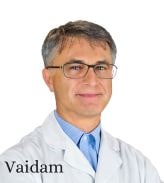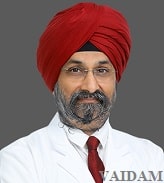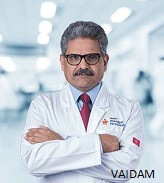Top Doctors For Arrhythmia Surgery Treatment in India View all (16130)
Choose specialists in a city
Selected :




Ensure Your Heart is in Capable Hands with World-class Cardiologists
Arrhythmia is a heart disorder in which the heartbeat rate or rhythm is irregular—too slow, too fast or completely out of whack. When the heartbeat is too slow, it is known as bradycardia and if it beats too faster than normal, it is called tachycardia.
In general, arrhythmias are harmless but some can cause serious problems, and some may even be life-threatening. Irregularity in the heart rate impedes the heart’s ability to supply enough blood to the body resulting in serious brain, heart or organ damage.
In simple terms, arrhythmias are caused by a problem in the internal electrical system of the heart that is responsible for controlling its rate and rhythm. When the heart is in a normal working condition the electrical signal flows from the top to the bottom of the heart. This electrical signal, as it travels on its path, causes the heart to contract and pump blood. A similar cycle repeats itself with each heartbeat. An arrhythmia occurs if there is any problem in the flow of this electrical signal in the heart.
Types of Arrhythmia
Arrhythmia can be classified into two categories, namely ventricular and supraventricular. Ventricular arrhythmias, as the name suggests occurs in the ventricles, which are located in the lower chambers of the heart. Supraventricular arrhythmias happen in the upper chamber of the heart which is located above the ventricles. This upper chamber is called the atria. The nature of arrhythmias can be broadly differentiated into two types. If the heart beats to fast, it is known as tachycardia, and if it’s too slow, it is called bradycardia.
Bradycardia
If your heart beats less than 60 per minute, it’s generally regarded as bradycardia. This occurs when the sinoatrial node (SA) node, which is the heart’s natural pacemaker, is unable to generate the electrical impulse that directs the heart to contract. It may also occur if the electrical impulse does not reach the ventricles through the correct channels. Often, too slow heartbeats are associated with elderly people but they can affect the young as well. There could be two possible causes for bradycardia. First, the SA node may be damaged or secondly, when the central nervous system fails to signal the heart that it has to pump more blood. These medical conditions may be due to aging, heart disease or congenital heart defects. It may also occur due to medications taken to control high blood pressure and arrhythmias.
Tachycardia
Your heart is considered to be in tachycardia if it beats at a very fast rate of more than 100 beats per minute. Tachycardia is of many types and categorized according to its location in the heart. One that begins in the ventricles is called a ventricular tachycardia, while that which begins above the ventricles is called supraventricular tachycardia.
As mentioned earlier, arrhythmias can be categorized into two different types: ventricular arrhythmias and supraventricular arrhythmias. Let’s learn more about them below.
In general, supraventricular arrhythmias are not as dangerous as ventricular arrhythmias. They may happen for a number of reasons including consumption of alcohol, coffee, tobacco, and cough and cold medicines. Other reasons include hyperthyroidism and rheumatic heart disease. Chest tightness, fast pulse, shortness of breath and heart palpitations are some of the symptoms of supraventricular arrhythmias.
Signs and Symptoms
Some common symptoms of arrhythmias include:
Arrhythmia Treatment
Your doctor will decide on the treatment approach based on the type and severity of arrhythmia. Arrhythmia is commonly treated by medicines, surgery or medical procedures. When an arrhythmia causes regular chest pain, fainting and dizziness then you are recommended to go for treatment by your doctor. Treatment is a must if you have increased risk of strokes, heart failure or cardiac arrest.





Patient Testimonials For Cardiology And Cardiac Surgery Procedures in India